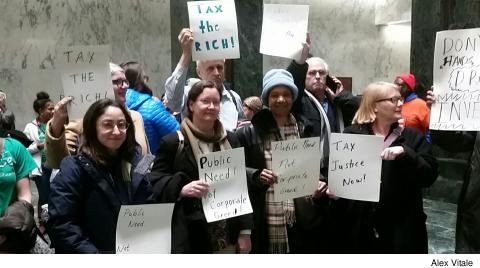Editors Note: Nearly a dozen PSC members – as well as activists from groups like Citizen Action, VOCAL-NY, the New York State Council of Churches, a Stronger Economy for All and New York Communities for Change – came together for a revenue-focused day of action at the New York State Capitol on February 7, as lawmakers met to discuss taxation and the budget. The timing wasn’t accidental: the activists successfully disrupted the hearing in order to demand expansion of the millionaires’ tax, an end to the tax loophole for carried interest and an end to corporate welfare programs.
Such a plan, activists said, would add $8 billion into the state budget, which could be used for K-12 schools and public universities. “This was a major presence for a redistributive agenda,” said PSC First Vice President Michael Fabricant.
So far, Governor Andrew Cuomo has signaled that he supports extending the millionaires’ tax, and Assembly Speaker Carl Heastie has proposed a higher tax rate on the wealthy. However, the Republican-controlled Senate has yet to support the extension.
PSC delegate and officer Alex Vitale was among the group protesting for new taxes of the wealthiest New Yorkers to fully fund public higher education:
This spring, the so-called “millionaires’ tax” is set to expire in Albany. The loss of that tax, which creates a higher tax bracket for those with incomes over a million dollars, would leave a $3 billion to $4 billion hole in the state budget that even Governor Andrew Cuomo admits would be devastating. Such an event would trigger significant cuts to a variety of social services and undoubtedly to CUNY.
Some have claimed that taxing the rich will cause them to leave, but there is little empirical evidence to support this. In past research, relative tax rates play a marginal decision in where high earners live. Access to jobs and quality of life concerns rank much higher. In fact, according to the Fiscal Policy Institute, during the time the tax has been in place the number of New Yorkers reporting incomes over $1 million has increased 33 percent from 35,802 in 2010 to 47,440 in 2014.
THE TRUMP EFFECT
The need for this tax has only increased under the new Trump administration. Elimination or restructuring of the Affordable Care Act could cost the state up to $3 billion. In addition, there is a risk that Congress may move to end the tax exemption for local and state income taxes, placing additional pressure on middle-class New Yorkers. Finally, Trump’s threats against so-called “sanctuary cities” could create additional financial challenges – he has said he would withhold federal funds from municipalities that don’t comply with his agenda on undocumented immigrants.
The millionaires’ tax was last set to expire during the height of the Occupy Wall Street movement. Activists in New York and nationally hounded the governor, demanding that he reinstate it. Despite his repeated pledges to let it expire, Governor Cuomo responded to public pressure and renewed it, although in a weaker form. This time around, pressure is needed to expand the tax. Over the last 40 years, New York has seen an explosion of very high incomes and the rise of the billionaire class isn’t reflected in the state’s tax policy.
A STARVED STATE
| Decades of tax cutting, combined with failure to create new higher tax brackets, means that the state has had less revenue to work with and the burden on the middle class has increased.
In February, a coalition of community groups including Citizen Action of New York, New York Communities for Change, Make the Road New York, VOCAL-NY and the CUNY Rising alliance (of which the PSC is a member) went to Albany to begin putting pressure on the state government to institute a tax policy that ensures the rich pay their fair share. |
In a series of actions, activists repeatedly interrupted a joint Assembly and Senate budget hearing on tax policy chaired by Democrat Herman Farrell of Manhattan, who tried to block the protest, but stopped short of requesting arrests.
As protests against the Trump administration mount, it’s important to remember that we face austerity budget pressures here in New York. We must remain focused on the immediate threat that it presents to our members, CUNY and our students.
Alex Vitale is an associate professor of sociology at Brooklyn College and the PSC vice president for senior colleges.


